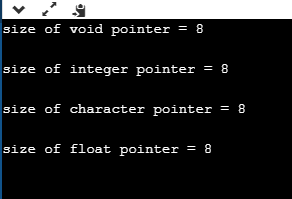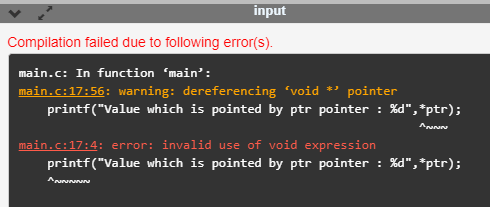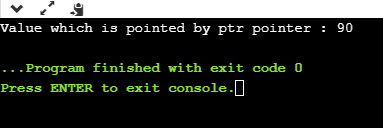void pointer in CTill now, we have studied that the address assigned to a pointer should be of the same type as specified in the pointer declaration. For example, if we declare the int pointer, then this int pointer cannot point to the float variable or some other type of variable, i.e., it can point to only int type variable. To overcome this problem, we use a pointer to void. A pointer to void means a generic pointer that can point to any data type. We can assign the address of any data type to the void pointer, and a void pointer can be assigned to any type of the pointer without performing any explicit typecasting. Syntax of void pointerDeclaration of the void pointer is given below: In the above declaration, the void is the type of the pointer, and 'ptr' is the name of the pointer. Let us consider some examples: int i=9; // integer variable initialization. int *p; // integer pointer declaration. float *fp; // floating pointer declaration. void *ptr; // void pointer declaration. p=fp; // incorrect. fp=&i; // incorrect ptr=p; // correct ptr=fp; // correct ptr=&i; // correct Size of the void pointer in CThe size of the void pointer in C is the same as the size of the pointer of character type. According to C perception, the representation of a pointer to void is the same as the pointer of character type. The size of the pointer will vary depending on the platform that you are using. Let's look at the below example: Output 
Advantages of void pointerFollowing are the advantages of a void pointer:
Output 
Some important points related to void pointer are:
The void pointer in C cannot be dereferenced directly. Let's see the below example. In the above code, *ptr is a void pointer which is pointing to the integer variable 'a'. As we already know that the void pointer cannot be dereferenced, so the above code will give the compile-time error because we are printing the value of the variable pointed by the pointer 'ptr' directly. Output 
Now, we rewrite the above code to remove the error. In the above code, we typecast the void pointer to the integer pointer by using the statement given below: (int*)ptr; Then, we print the value of the variable which is pointed by the void pointer 'ptr' by using the statement given below: *(int*)ptr; Output 
We cannot apply the arithmetic operations on void pointers in C directly. We need to apply the proper typecasting so that we can perform the arithmetic operations on the void pointers. Let's see the below example: The above code shows the compile-time error that "invalid use of void expression" as we cannot apply the arithmetic operations on void pointer directly, i.e., ptr=ptr+1. Let's rewrite the above code to remove the error. The above code runs successfully as we applied the proper casting to the void pointer, i.e., (float*)ptr and then we apply the arithmetic operation, i.e., *((float*)ptr+i). Output 
Why we use void pointers?We use void pointers because of its reusability. Void pointers can store the object of any type, and we can retrieve the object of any type by using the indirection operator with proper typecasting. Let's understand through an example. Output 
Next TopicC dereference pointer
|
 For Videos Join Our Youtube Channel: Join Now
For Videos Join Our Youtube Channel: Join Now
Feedback
- Send your Feedback to [email protected]
Help Others, Please Share









